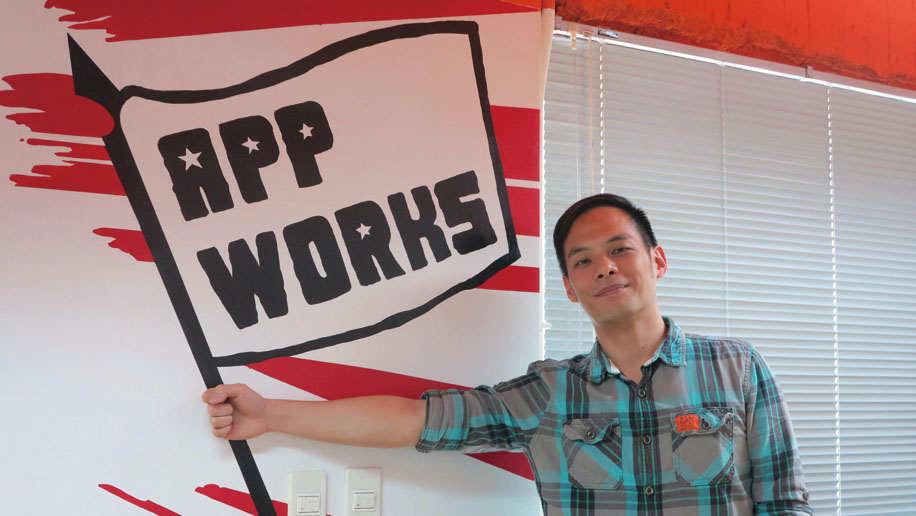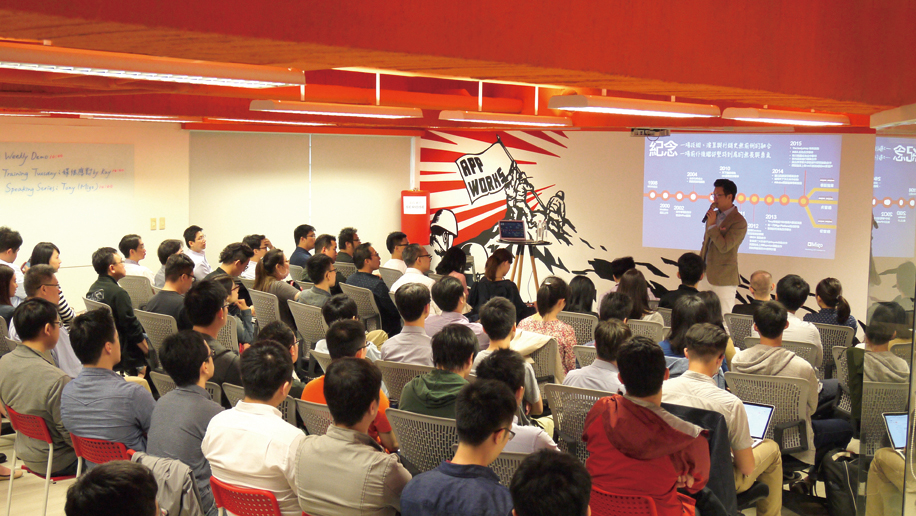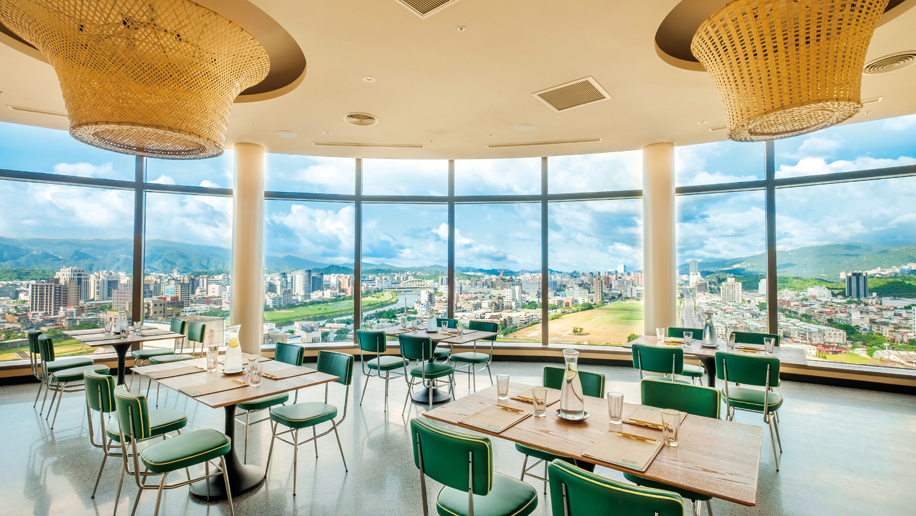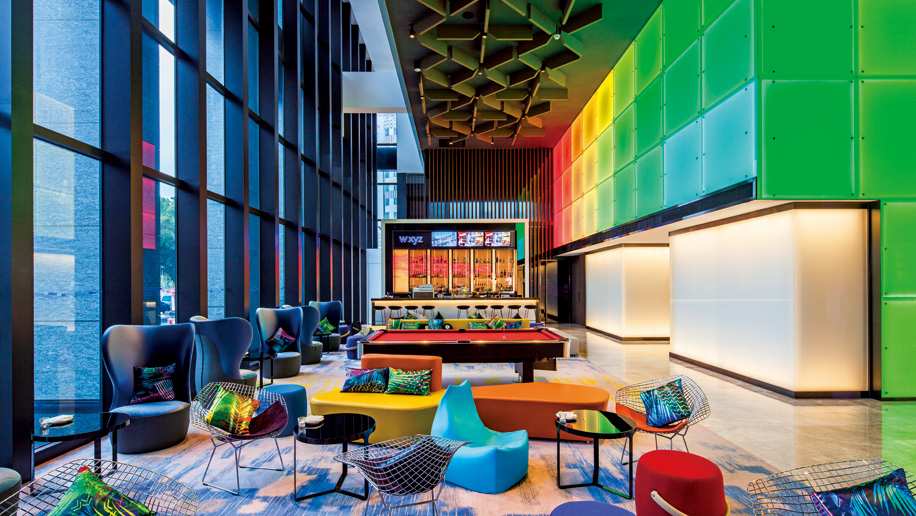
On a Saturday afternoon in March, I headed to App Works, one of Asia’s largest start-up accelerators, which focuses on internet-oriented ventures. Housed in a commercial building in the heart of Taipei’s CBD, the modern 1,150 sqm “school for start-ups” was buzzing with activity despite the weekend.
In one of the 11 glass-fronted meeting rooms, a group of 30-somethings were locked in animated discussion, surrounded by notes, spreadsheets and diagrams. A Powerpoint presentation was taking place next door under a bright-orange ceiling with a bold call-to-action graffiti mural in the background. In another corner of the centre, I spied a standalone basketball hoop that added a definite “Google HQ” feel.
App Works was founded in 2009 by Jamie Lin, a successful entrepreneur and chairman of the Taiwan Internet and E-Commerce Association, who’s on a mission to ensure Taiwan – and Southeast Asia as a whole – takes its place in the forefront of the current digital revolution. “The internet is rewriting human society,” says Lin. “Our thesis is, if you don’t leverage the internet in the 21st century, it’s probably impossible for you to be successful.”
Every six months, App Works accepts 35 start-ups who benefit from one-on-one mentoring, immersion in a community of like-minded entrepreneurs, and opportunities to pitch for investment from prominent corporate partners.
“If you want to be a journalist, you go to a school of journalism, learn a lot, get a degree and embark on your career,” says Lin, “whereas if you want to be a start-up founder, there’s no school for you to go to. And actually, most start-ups will fail, so it would be weird to pay tuition for that. We don’t charge anything, and it’s more like design school, where you learn by inspiration, not repetition.”
The results are impressive: after seven years, App Works has 305 active start-ups in its community generating US$850 million per year and with 3,800 employees. Together, they are valued at more than US$1 billion.

Start-ups play catch-up
Lin’s reason for setting up the centre and playing such an active role in Taiwan’s start-up community is simple. “Some of the countries in this region missed the boat at the turn of the last century. China for example was a power country in the 19th century, but it missed the Industrial Revolution so it became an underdog, the ‘sleeping dragon’. I don’t want to see that happen again to Asian countries where this digital revolution goes on and we miss out.”
Lin is right to be concerned. By the 1980s, Taiwan had established itself as one of the biggest electronics manufacturers on the planet – arguably the most ferocious of all Asia’s tiger economies. This continued throughout the 90s, with major multinational firms such as Acer, HTC and Foxconn all hailing from Taiwan. According to The New York Times, in 2001 Taiwan was making 53 per cent of the world’s laptops and 25 per cent of its desktop PCs, plus an even larger percentage of peripheral products like scanners, monitors and keyboards.
Even now, Taiwan is still a massive producer, supplying components for companies such as Apple, Microsoft, Compaq, Dell and IBM. However, during the past decade the economy has stagnated. According to April 2016’s Asian Development Outlook, Taiwan’s GDP in 2015 grew just 0.7 per cent, while the 2016 forecast was just 1.1 per cent – lagging far behind key Asian neighbours such as South Korea (2.6 per cent), Hong Kong (2.1 per cent) and China (6.5 per cent).
Part of the problem is the growing competition from these neighbouring countries: Taiwan is no longer the only country with the ability to mass-produce technical parts. With cheaper alternatives, electronic giants are naturally shopping around, leaving Taiwan’s export-reliant economy in shock.
And this is the second part of the problem: while Taiwan has excelled in hardware, it hasn’t managed to bridge the gap into software – developing applications for the Internet of Things (IoT) – and so has lost its technical edge. The innovation and creativity needed to go to the next level just isn’t there.

Plan of action
Luckily, it’s not just Lin who is determined to stop Taiwan being left behind. Recognising this shortfall, the government has started to play a much more active role in supporting entrepreneurial efforts, with high-tech parks and hubs being established in cities such as Hsinchu and Taipei. The Taiwan Startup Stadium is one such example.
In 2016, President Tsai Ing-wen underlined this commitment, unveiling plans to create the “Asian Silicon Valley” – a crucial part of her bold 5:2 reforms to rejuvenate the ailing economy. The Asian Silicon Valley Development Agency (ASVDA) was officially inaugurated in January this year, with headquarters set up in Taoyuan to foster the creation of an innovation hub in the country’s main international gateway.
CEO of the ASVDA committee, Gong Mingxin revealed: “According to institutions like McKinsey, the estimation for the global market value of the Internet of Things by 2025 is US$6.2 trillion. If we can get 5 per cent of that market share, it’s worth about US$310 billion – so there is great potential. Actually, the potential economic value is much higher when you consider the knock-on effects to our everyday lives.”
The ASVDA initiative is comprehensive, with a realistic assessment of the country’s strengths and weaknesses, and a strategy devised to bridge the gap. “There are a number of bottlenecks in Taiwan,” says Gong. “Businesses concentrate mainly on manufacturing in their specific domains, with little effort put into things like research and development. There’s also little involvement with international IoT organisations and even a lack of integration among local IoT communities.”
The plan is to create an all-encompassing ecosystem that connects universities, corporations, research institutes, start-up communities and research and development clusters. By creating the right breeding grounds, the government hopes to encourage collaboration, creativity and eventually a vibrant industry that sparks innovation, start-ups and even a few unicorns (the industry term for start-ups so successful they are valued at more than US$1 billion).
The government has set aside NT$10 billion (US$331.4 million) for the first year, with a further NT$100 billion (US$3.3 billion) planned to support various initiatives that will mature by 2023. The funds will be invested directly into this ecosystem, via initiatives such as financial support programmes for creative entrepreneurs, supporting funding from angel investors, and making young entrepreneur start-up loans available.
The government, in partnership with venture capitalists, has also handpicked 21 start-ups to receive direct investment, with the aim of developing up to 100 companies over the next seven years. Part of the focus will be to continue the efforts of the Taiwan Startup Stadium (launched in 2015) by fostering innovation in IoT with diversified test beds for smart products and services.

Casting the net wide
But while creating a thriving home network is important, the government is also keenly aware of the need to establish international links and attract foreign talent. To this end, the government is working on major economic legislation reforms to relax restrictions on foreign and overseas student visas, provide tax breaks for foreign companies and provide incentives to attract foreign talent in the form of health insurance plans, salaries and retirement pension plans.
Sending local talent out to become educated and forge international connections is another key aim. Many of Taiwan’s leading companies throughout its golden period were formed by Taiwanese returning from Silicon Valley with knowledge, innovation and connections. However, the tendency for students to study abroad has also tailed off. The government now plans to sponsor 500 individuals to go to Silicon Valley over the next four years and bring back lessons from the technological nexus.
Lin agrees that fostering international communities is key: “What we’re seeing is that no company in this region can survive by having only its own country as a market. Eventually it has to try to become a regional player.
“The reason why Silicon Valley is so successful is its ability to attract not just the best talent from the US, but the best talent from all over the world. So as a company, you can go there, set up shop and very easily recruit talent for the global market. For Taiwan to have the same success, companies need to be able to recruit talent from other regions.”
While Lin reserves some scepticism for the government’s grand ambitions, he nevertheless applauds the initiative and has already seen some encouraging signs: “A few big international players have recently announced plans to have a bigger footprint in Taiwan. Facebook just brought their start-up programme to Taiwan. Tesla also recently set up shop here.
“I’m still very bullish for Taiwan. At the end of the day, it’s probably the best place to live in the whole of Asia, and that’s a huge advantage. But we need to fix some fundamental problems, so that more people want to come here and start their start-up.”

Hotels for millennials
The hospitality industry seems to be tuned in to Taiwan’s ambitions for a new digital-focused economy, with a raft of cool new “millennial-minded” hotels popping up.
In January, Aloft Taipei Beitou opened its doors – the second Aloft-branded property in the capital. The new 292-room hotel has been developed with a strong focus on design and technology. Public areas and guestrooms feature works by local artists showcasing elements indigenous to Beitou, while the loft-inspired rooms and suites are equipped with SPG Keyless technology, allowing guests to access their rooms using their mobile device.
Key among the hotel’s offerings is its social spaces, including F&B and events areas. The hotel’s ground-floor Re:mix lounge has six-metre-high ceilings with butterfly wing-styled wooden panel lighting – along with a large floor-to-ceiling, pixelesque LED wall. The hotel’s pet-friendly restaurant Nook is an American-style eatery, while live acoustic music performances are offered at W:XYZ bar.
“Looking for a different hotel experience?” asks the homepage of the Amba Taipei Songshan, which opened in August last year. Designed for the “savvy urban traveller who appreciates creativity, connectivity and conservation”, Amba Taipei Songshan focuses on adding an element of fun through modern, playful design and large, open social areas. All 189 rooms are “digital ready” with power access and fast, free wifi, while the “next-generation” design hotel concept incorporates ecofriendly materials and all-natural products.
Artyzen Hospitality’s lifestyle hotel concept, Citizen M, is also due to open in Taipei soon. It will be located in the colourful retail and entertainment district of Ximending, close to the city’s pedestrianised shopping area and railway station. Like all Citizen M hotels, it will feature a “hive” living room lobby filled with art and designer furniture, along with multiple zones to work, meet and connect.
Another signature element is the on-site F&B, with outlets such as Canteen M, a 24-hour cocktail bar and restaurant. Check-in and checkout processes are via touchscreen terminals with assistance from the hotel’s ambassadors. Other features include rooms controlled via tablet, wireless streaming to smart TVs, a 24-hour self-service canteen, and “absolutely no trouser presses, bellboys, towel swans or pillow chocolates”.












